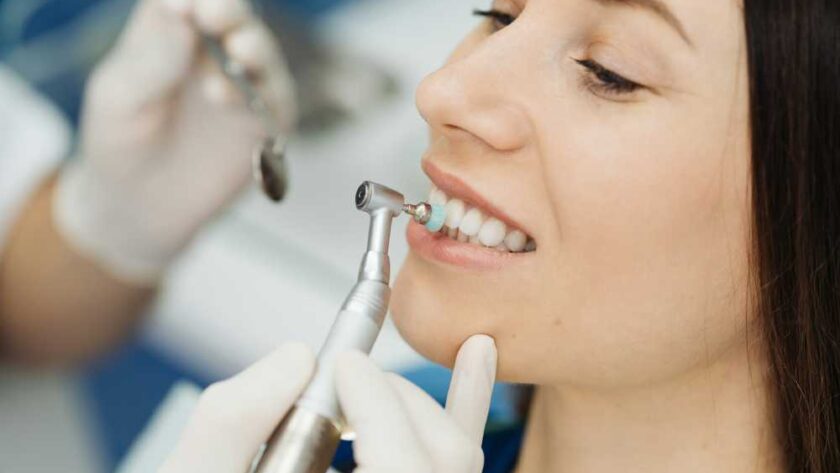Ensuring optimal dental health involves much more than simply brushing your teeth when you wake up or before you go to sleep. It’s about cultivating a comprehensive oral care regimen that strengthens teeth and entire oral health, including gums and the tongue. This routine includes choosing the right toothbrush and incorporating flossing into your daily habits. Additionally, using available dental care options like dental HMO (DHMO) insurance plans can significantly impact oral health.
These plans make essential dental visits and preventive treatments more affordable and accessible, providing the support you need to maintain a healthy smile. They offer accessibility to regular oral check-ups, which are vital in identifying and addressing potential dental issues before they escalate. The emphasis is not on reacting to dental problems after they occur but on proactively managing oral health.
Contents
Fundamental Elements of Dental Health
A plethora of elements make up the foundation of sound dental health. One often overlooked yet vital aspect is salivary health. Saliva is a natural cleanser, continually coating the teeth to wash away food particles and bacteria.
It has enzymes that initiate digestion and neutralize acids generated by bacteria in the mouth. It also provides the initial defense against decay and infection, crucial in keeping both teeth and gums healthy. Moreover, fluoride is revered for its role in hardening tooth enamel, preventing cavities and reducing tooth decay risk.
Essential Daily Dental Care Practices
Adhering to daily dental practices is the cornerstone of oral care. Most dental professionals recommend brushing fluoride toothpaste at least twice a day, which helps protect your teeth from decay. It’s crucial to spend two minutes brushing, ensuring you reach every surface of your teeth, including the front, back, and chewing surfaces.
The technique counts: gentle circular motions are ideal since they efficiently eliminate plaque while preserving the gums. Flossing should not take a back seat either, as it removes debris and plaque from the places a toothbrush cannot reach, particularly between the teeth and under the gumline.
While many sometimes skip mouthwash, it’s a beneficial addition for flushing out bacteria that might remain after brushing and flossing. It can also help strengthen enamel and remineralize teeth, leaving your mouth fresh and clean throughout the day.
Choosing the Right Dental Products
With so many dental products available, making the right choice can seem overwhelming. Sensitivity issues? Opt for toothpaste designed to alleviate that discomfort without compromising cleaning power. Do you prefer an eco-friendly option? Bamboo toothbrushes are becoming more popular as an eco-friendly option.
When considering a toothbrush, electric models have been proven to eliminate more plaque and decrease gingivitis more efficiently than manual brushes, though either can be effective when used correctly. Interdental brushes are handy for people with braces or dental work, reaching spaces that floss might miss. Evaluate features such as brush head size, bristle type, and handle comfort, and choose what aligns best with your dental needs and preferences.
The Role of Diet in Oral Health
The food and drinks you consume have a substantial impact on oral health. Dairy products like milk, cheese, and yogurt offer calcium, essential for maintaining the strength of your teeth and bones. Additionally, casein protein found in these foods can help strengthen the surface of the teeth. Foods rich in phosphorous, such as nuts, eggs, and meat, help rebuild tooth enamel and provide extra protection against cavities.
Restricting the consumption of sweet treats and drinks is prudent, as they can contribute to plaque formation and promote tooth decay. Drinking water, especially fluoridated water, promotes healthy oral hygiene by rinsing away food debris and maintaining moisture in the mouth.
Innovative Trends in Dental Care
Staying updated with technology can significantly enhance your oral care regimen. Electric toothbrushes have been designed to eliminate additional plaque and decrease gingivitis more efficiently than manual toothbrushes. These toothbrushes often have features like pressure sensors to prevent brushing too hard, various brushing modes, and timers to ensure adequate brushing time.
For those who find flossing cumbersome, water flossers provide a convenient alternative, using pulsating water to clean between teeth and along the gumline.
Moreover, smart toothbrushes can offer real-time feedback on your brushing habits via connected apps, providing personal coaching to improve your technique and consistency. These technologies are more than just innovations: they signify a paradigm transformation in how we approach daily oral care, making it more efficient and engaging.
Tips For Maintaining Oral Hygiene in Kids
Fostering proper dental habits in children is essential for lifelong oral health. It can be helpful to turn brushing sessions into fun activities—play a favorite song that lasts two minutes or use stickers as a reward system to create positive reinforcement. Choose colorful or themed brushes to make the experience enjoyable for children.
Using floss sticks might make it easier for parents to help young children floss until they can do it independently. Instructing kids on the importance of dental hygiene can empower them to take charge of their dental health early on. Please encourage them to make healthy dietary choices, like choosing fresh fruits and vegetables over candy and sugary treats, to help protect their teeth from a young age.
Common Dental Mistakes to Avoid
A few common mistakes can inadvertently sabotage your oral care efforts. Brushing with excessive force can erode enamel and cause irritation of gums, leading to issues like receding gums and tooth sensitivity. Switching to a brush with soft bristles can help prevent these problems.
Flossing is a step that is often neglected, but skipping it can leave plaque and decay-causing bacteria between your teeth, eventually leading to cavities and gum disease. Many people also delay or skip visits to the dentist, which can lead to problems going unnoticed until they become serious. Regular visits allow for early detection and better oral health management, helping prevent more extensive and expensive treatments.
Conclusion
Establishing and maintaining a balanced oral care routine is instrumental in safeguarding dental health from common pitfalls and diseases. One can cultivate strong and healthy teeth and gums by integrating diverse practices, utilizing the right products, embracing innovative trends, and addressing the dietary aspects of oral care.
Whether through regular visits, technology, or simple daily habits, the commitment to oral health assures a confident smile, fresh breath, and robust dental wellness for years to come. Taking these steps doesn’t just improve your oral health; it enhances your overall well-being, reflecting the deep connection between oral and general health. Commitment to oral care today means stronger, healthier teeth tomorrow.




